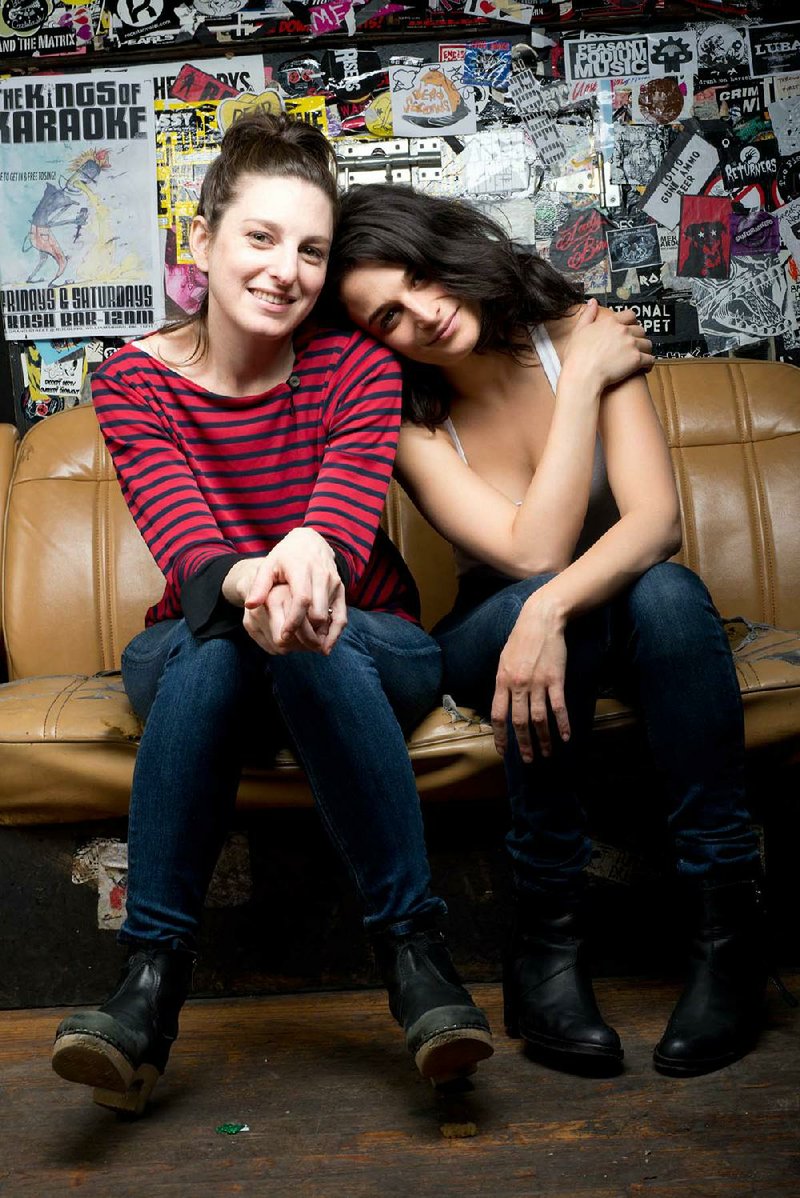"It's hard to be funny," says writer-director Gillian Robespierre about her feature debut Obvious Child. "I'm not saying I'm Mel Brooks at all. He's a hero."
Speaking from New York, the filmmaker may have made her challenge even more formidable by having her lead character Donna (played by Saturday Night Live alumna Jenny Slate) resolve to get an abortion after a series of events in her life go terribly wrong. Donna is also juggling the loss of her day job, an acrimonious split with her boyfriend, disapproving parents (Richard Kind and Polly Draper) and a new guy (Jake Lacy) she likes but doesn't feel comfortable around.
Because Donna, like Slate, works as a stand-up comic, even something deeply personal and politically charged can wind up in the comedian's act.
"It was very tricky," Robespierre says. "It was hard to write a stand-up scene that was funny but you also want it to be heartfelt, too."
By using bits of her stand-up to show how Donna changes through the film, Robespierre attempts to make the film more than a simple pity party for the protagonist. "By the time we get to the last part of the stand-up, we feel like we've gone through a journey with her."
When I suggested one segment had some YouTube-worthy bursts of emotion, the director retorted. "I think it's really a storytelling bit. It's six minutes long. Nobody watches YouTube for six minutes. If she said something really horrific in under a minute, then it's something that would go viral. This is more of a thoughtful story."
If figuring out how to juggle the heartbreaks in Donna's life with comedy seems challenging, Robespierre seems to have succeeded because the film -- which opens in Arkansas on Wednesday -- was a hit at the Sundance Film Festival and currently rates 89 percent on the critical consensus site Rotten Tomatoes.
STORYTELLING VS. ADVOCACY
Much of the acclaim may come from the fact that Obvious Child and the 2009 short film (also starring Slate) doesn't take an advocacy angle. The scenes where abortion is discussed are often grim and scary. It's not content that fits easily onto a bumper sticker.
"This is one woman's story," Robespierre says. "It's Donna's story. There's a lot going on in her life. It's a character study of this woman dealing with issues of confidence and being somebody who is not being very strong in her own life."
She adds, "This is just one woman's story, and we hope Obvious Child [connects] on many different levels. And a lot of people are. A lot of men and women have come up to me after screenings -- and I don't think they're lying to me -- when they say, 'Thank you for making this movie, and we can't wait to see what else is up your sleeve.'"
When asked how her film might compare to more mainstream movies like Juno and Knocked Up, which also dealt with unwanted pregnancies, Robespierre replied, "Millions of women face unplanned pregnancies each year. Each story and experience is very, very different. We just wanted Donna's story to be safe and free from shame."
Robespierre also quickly gives credit to others who helped keep Obvious Child from becoming a polemic. While Robespierre is capable of making quips, one of the most memorable sequences in the film is visual. A distraught Donna pours herself an excessively large glass of wine, starts to spit some out and then guzzles it all down. While the drinking was in the script, the "spit take" wasn't. "That was all Jenny Slate," she says.
NECESSARY FUNCTIONS
In many ways, Obvious Child seems less about unwanted pregnancies and more about the candid remarks Slate makes about the disturbing things the human body does.
Critics tend to tire of hearing bodily function jokes, but Slate and Robespierre seem to tell them more effectively than their peers.
"If you tell jokes and make stories that are authentic to your voice and are unwavering to the kind of humor you like, then it could possibly work. Jokes with scatological humor and the weird things our bodies do can be rather highbrow," she says. "The other components of the film also have to be thoughtful. The character structure has to be authentic throughout the whole film. You can't have a character who's a CEO and the next second they're telling a [coarse] joke. You have to work with the character you developed."
One example of Robespierre's attitude toward character development could be how Lacy's Max changes over the course of the film. He's unfailingly friendly toward Donna, but he seems occasionally skittish about getting to know her better. He's not the typical rom-com or young-adult leading man who does little more than stare lovingly, or, in the case of Edward Cullen, sparkle.
"We were making Max seem the polar opposite of Donna, with his frat boy face and his buttoned up collared shirts. But he's somebody who really enjoys her humor and enjoys the way she's open. In a way, he's her first stop in avoiding stigmas, because she was judging him by his cover. We peeled that away, and he's a really nice, supportive guy," Robespierre says.
ONE THING RIGHT
If making Obvious Child has accomplished one thing, it has forced more strangers to pronounce Robespierre's first name correctly. As her Twitter handle implies (@GillianHardG), the first syllable in her name rhymes with how a fish breathes. For all the radio and print interviews she has had, the tipoff has been useful.
"I made that a long time ago. I was regretting it, but now it seems very helpful."
MovieStyle on 06/27/2014

